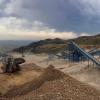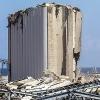Press Releases
Displaying Results 1 - 25 of 40
Today, a new project to be implemented by UNECE with the support of Switzerland was launched in Tashkent, underscoring Uzbekistan's commitment to improving water and health governance and safe management of industrial and tailing facilities.
Uzbekistan, the most populous Central Asian country,
Faced with increasing impacts of climate change, pollution and biodiversity loss, which together constitute the “triple planetary crisis”, no country can act alone. Like nature itself, these challenges know no borders, which makes international cooperation a crucial part of action to address them
Multilateral Environmental Agreements (MEAs) will be at the forefront of discussions at the sixth session of the United Nations Environment Assembly (UNEA-6) on how to tackle the triple planetary crisis.
Executive Secretary Tatiana Molcean will lead a UNECE delegation to UNEA-6, the world’s
Critical Raw Materials (CRM) like lithium, nickel, cobalt, copper, manganese, graphite and rare earth elements are crucial for renewable energy technologies like solar panels, wind turbines and for battery production, driving the global shift to electrification. Yet with surging demand,
Global biodiversity is now declining faster than at any time in human history. As leaders gather for the 15th Conference of Parties to the Convention on Biological Diversity (COP-15, 7-19 December), UNECE calls for the region to urgently step up with the leadership needed to stop biodiversity loss
“Within three decades, work under the Industrial Accidents Convention has been transformative for the UNECE region, enhancing the protection for humans and the environment and making it an example for transboundary cooperation on accident prevention and preparedness, which can serve as inspiration
UNECE Executive Secretary Olga Algayerova was in Kyiv on Sunday 9 and Monday 10 October to meet with Government officials to discuss UNECE support to the reconstruction of Ukraine. Since the start of the war, upon official requests for assistance from the government, UNECE has been providing
Ukraine will become a Party to the UNECE Convention on the Transboundary Effects of Industrial Accidents, following the deposit of its instrument of accession with the UN Secretary-General in New York on 6 July 2022. The Convention will enter into force for Ukraine on 4 October 2022. This follows
UNECE notes with concern the attacks on industrial facilities in Ukraine since the beginning of the war and calls for a prompt end of the hostilities and the prevention of technological disasters, which could affect the population and environment of Ukraine and neighbouring countries.
Since the
“The explosion came at a very high cost with over 218 deaths, 6,000 injured, and at least 15 billion USD in destruction to infrastructure. In around 15 minutes Beirut lost over 15 years of development gains. We must learn lessons from this catastrophic disaster, not just for Lebanon but for the
Today, the Inaugural Meeting of the Working Group on Tailings Safety and the Prevention of Accidental Water Pollution (IIWG) took place in Tajikistan, bringing together representatives of different national authorities, operators, international institutions and interested specialists to strengthen
The Beirut port explosion in August 2020, caused by fire spreading across a storage area detonating a large amount of ammonium nitrate (AN), resulted in 300 deaths and 6,500 injuries, the displacement of about 300,000 people and severe damage to the port and city, including healthcare facilities
Increasingly frequent and intense extreme weather events due to climate change that can lead to industrial accidents and unchecked urban and regional development could together be a recipe for disaster, warn the UN and the governments of Albania, Bosnia and Herzegovina, Montenegro, North Macedonia
Today, Serbia became the first country in the pan-European region to launch a National Policy Dialogue (NPD) on Industrial Safety, supported by UNECE in the framework of the Convention on the Transboundary Effects of Industrial Accidents (Industrial Accidents Convention). Since its accession to the
On 27 July 2021 around 9:40 am, a major explosion at the 480 hectare Chempark in Leverkusen, Germany, shocked the local population within a radius of 40km who heard and felt the detonation – and even beyond that, as the toxic plume was still visible in Dortmund, nearly 80 km away. The explosion
Industrial accidents at tailings management facilities (TMFs) - which handle and store the fine-grained waste materials remaining after extracting minerals and metals from the earth, often containing toxic and hazardous substances - have resulted in devastating effects on humans and the environment
The new repository will help address disaster risks in line with the 2030 Agenda for Sustainable Development
It consolidates good practices and lessons learned over the past decade in Europe and beyond in the fields of land-use planning and industrial safety
Disasters caused by natural hazards,
The eleventh meeting of the Conference of the Parties to UNECE’s Convention on the Transboundary Effects of Industrial Accidents (Industrial Accidents Convention), drawing to a close today, took place from 7-9 December 2020 – for the first time, in a hybrid form, in view of the COVID-19 pandemic.
For many countries, mining is an important industry in terms of economic and social development. Mining activities however generate hazardous waste that is commonly stored in ponds or tailings, often referred to as tailings management facilities (TMFs). Failures at TMFs have regularly led to
On Tuesday 4 August, a huge warehouse explosion in the port area of Beirut left over 135 people dead, 5,000 injured, 100 missing and 300,000 homeless, according to media reports. The explosions appear to have been caused by tons of ammonium nitrate. “I express our solidarity with the people of
Prevention, preparedness and response are key pillars of the UNECE Convention on the Transboundary Effects of Industrial Accidents which will celebrate its 20th anniversary of entry into force on 19 April 2020.The Convention was negotiated in response to the 1986 Sandoz chemical spill, which put
Another tragic industrial accident hit Brazil on 25 January 2019 when the Brumadinho dam failed at an iron ore mine in the South East of the country, killing over 65 persons with roughly 300 still missing. This comes just over 3 years since the Bento Rodrigues dam collapse in the country. Brazil
Over the last few years, the world watched on as major environmental disasters that triggered technological accidents, such as Hurricane Harvey and the Fukushima power plant disaster, wreaked havoc on environments, lives and economies. Major accidents with far-reaching adverse effects can happen
Man-made and technological disasters, whether caused by natural or man-made hazards, can cause severe damage to individuals, communities, economies, supply chains and the environment. Moreover, they may trigger secondary disasters, aggravating initial impacts. Industrial facilities, nuclear and
On 4 December 2018, more than 30 years after the transboundary environmental disaster at Sandoz, Schweizerhalle, and more than 25 years after the adoption of the UNECE Convention on the Transboundary Effects of Industrial Accidents, the 10th meeting of the Convention’s Conference of the Parties




















